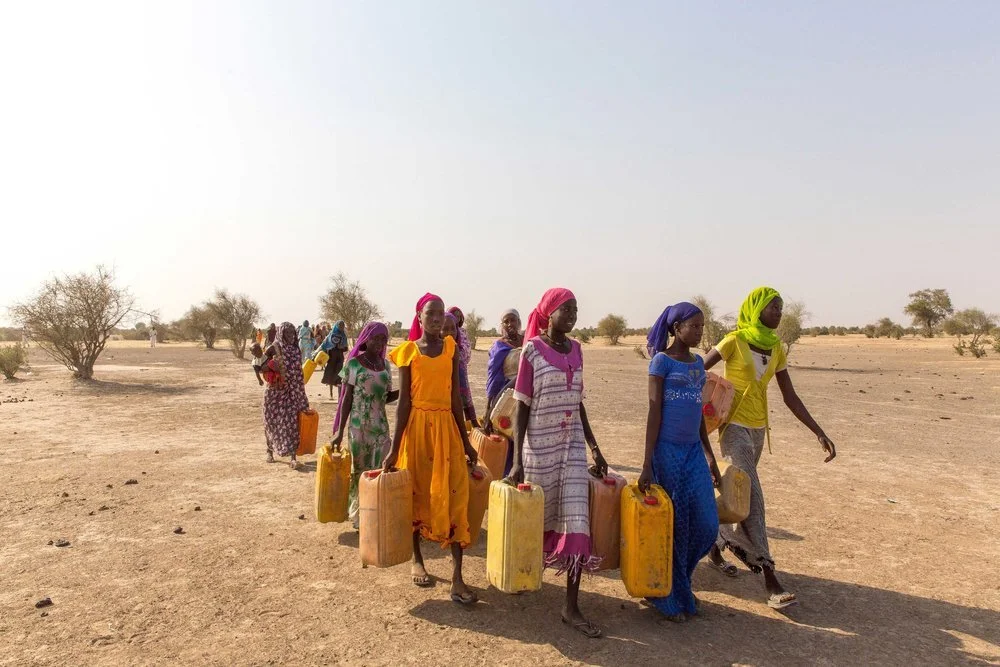If You Care About Climate Change, Fund Feminist Movements
Published in Inside Philanthropy | By Nidhi Sahni, Debby Bielak, and Sonali Madia Patel
Extreme weather is here, and more is on the way. Europe and the United States are suffering through sweltering heat waves this week, including in regions ill-equipped for dealing with such dangerous temperatures. Meteorologists anticipate this year’s hurricane season will be intense, with up to 20 “monster storms.” Meanwhile, the New York Times is reporting an “explosive, early start” to this year’s Southwestern fire season, with the largest blaze in New Mexico’s history destroying hundreds of homes and causing untold damage. As events like this escalate, the toll on human lives will be high — especially for women.
Natural disasters impact women more. Following Hurricane Katrina, domestic violence rates spiked and remained elevated for two years. And while many men returned to work in jobs of equal status to their pre-hurricane jobs, women absorbed more child care responsibilities, had lesser access to loans and experienced higher rates of business failure.
The toll is even higher for women, girls and nonbinary people from Black, Indigenous, or other communities of color, particularly in the Global South. Currently, drought and resultant hunger in the Horn of Africa is leading to a sharp increase in child marriage, as families marry their daughters into wealthier families that may be able to feed them. In the 2004 Indian Ocean tsunami, men outnumbered women survivors 3 to 1, due in part to cultural norms in Sri Lanka that made it inappropriate for women to learn to swim. More broadly, women are 14 times more likely to die during natural disasters.
While climate events exacerbate existing gender inequalities, the women, girls and nonbinary people who endure them are precisely the folks who can help solve our climate crisis. They know from experience what changes are needed, and they have the drive to realize those changes. Indeed, their survival depends on it.
Our recent report, “Lighting the Way: A Report for Philanthropy on the Power and Promise of Feminist Movements,” co-authored by The Bridgespan Group and Shake the Table, highlights the importance of feminist movements to social change. These movements represent a profound and largely untapped opportunity for climate philanthropists to unlock sustainable climate solutions that will benefit us all.
Examples of their effectiveness abound. Consider the women in India’s Sunderbans mangrove forest who have planted thousands of mangrove trees to protect themselves from cyclones and rains. Or take Tenure Facility, which supports Indigenous women in the tropical forests of Latin America, Africa and Asia to secure and sustain land rights. In its first five years, Tenure Facility achieved or advanced the titling of 14 million hectares, giving 7.2 million people a greater say over how their land is used. Executive Director Nonette Royo attests that the work requires “deep listening and letting communities lead the process.”
Community-led feminist movements are a powerful vehicle for addressing climate change. Yet, despite punching well above their weight, they’re chronically overlooked and underfunded. In recent years, less than 1% of total foundation giving and approximately 1% of gender-focused aid went to women’s rights organizations, which we use as a proxy for feminist movement funding, for lack of other data. Most women’s rights organizations have never received core or multiyear funding.
Similarly, less than 1% of philanthropic environmental funding goes to grassroots climate action in the Global South, which excludes the populations often most affected by climate change and neglects their high-impact conservation methods.
Our report urges donors and high-net-worth individuals to give big to feminist movements — an additional $1.5 billion a year. You can give directly to feminist movements if you have the relationships to do this. Or you can invest via feminist funds, which are the primary funders of feminist movements — particularly in the Global South. Shake the Table offers a list of feminist funds, which Bridgespan research indicates are ready to absorb 10 times their current funding.
Climate-focused feminist funds, such as Global Greengrants Fund, the Pastoral Women’s Council, Urgent Action Fund, and MADRE, fund across movements to promote more systemic change. For example, MADRE is funding broadly in Kenya and Sudan to help women mitigate the effects of drought with water storage tanks and unique water harvesting techniques.
Earlier this month, at the U.N. Climate Change Conference in Bonn, outgoing U.N. Climate Change Executive Secretary Patricia Espinosa acknowledged “climate change is expanding exponentially” and underscored the need to move quickly. As extreme weather looms large and harrowing for all of us, especially for those with the fewest resources to withstand it, the need for speed is palpable.
We urge you give now to feminist movements, to accelerate the work of the organizations, leaders and networks already hard at work on the creative climate solutions we so desperately need.
Nidhi Sahni is a Bridgespan partner and head of US Advisory Services. Debby Bielak is a Bridgespan partner focusing on the inter-related areas of economic opportunity and mobility, place-based change, and advocacy and influence. Sonali Patel is a Bridgespan partner working on a wide range of projects varying from initiative strategy to organizational design.

